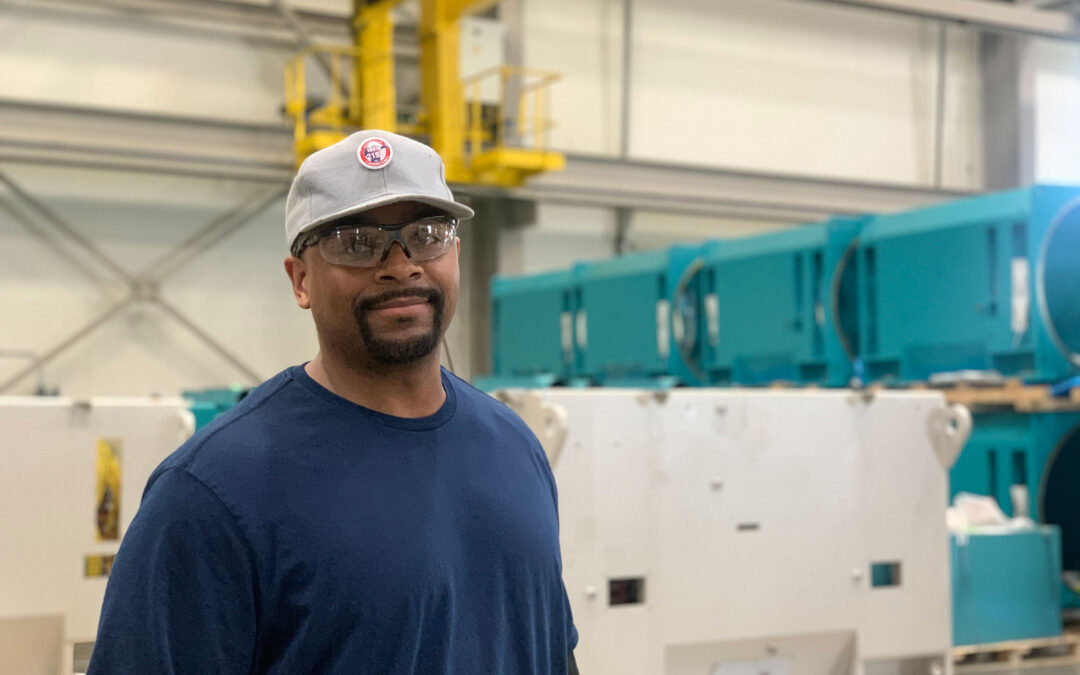
by Jodi Jean Amble | May 17, 2022 | Advocacy, Community, Electric Vehicles, Jobs, Local Initiatives, Renewables, Solar, Wind
RENEW Wisconsin has launched two state-wide communications campaigns to promote the benefits of clean energy investments in Wisconsin. The two campaigns, “Clean Energy Works for Wisconsin” and “Clean Energy is Made in Wisconsin,” include print and digital ads and shareable communications assets for partners and clean energy advocates.
Wisconsin’s clean energy workforce is 70,000 strong, with good-paying local jobs like installing solar and electric vehicle charging stations, manufacturing energy storage systems, servicing wind turbines, and retrofitting buildings. Clean energy job growth is gaining momentum from state and federal clean energy and electric transportation commitments, federal funds to support these goals, and an increased interest in clean energy investments from the public sector. The “Clean Energy Works for Wisconsin” campaign highlights the job potential of continued investment in electric transportation and Wisconsin clean energy.
“Over the next five years, Wisconsin can expect to receive $79 million in federal funds from the bipartisan infrastructure law,” said Francisco Sayu, Emerging Technologies Director at RENEW Wisconsin. “Wisconsin will also have the opportunity to apply for $2.5 billion in competitive grant funding dedicated to electric vehicle corridors and community charging. Building a network of electric vehicle charging stations will reduce emissions, improve air quality, and create thousands of good-paying jobs and is a tremendous opportunity for Wisconsin residents.”
In 2019, Governor Evers set a goal that all electricity consumed in the state will be 100% carbon-free by 2050, and in 2022 introduced Wisconsin’s first-ever Clean Energy Plan. Currently, renewable energy only accounts for 13% of all electricity sold in Wisconsin. According to the U.S. Energy Information Administration, Wisconsin consumes almost six times as much energy as it produces and spends billions on coal, oil, and natural gas every year. The “Clean Energy is Made in Wisconsin” campaign presents a vision of keeping more energy dollars in-state by investing in homegrown renewable energy.
“State and federal investments are moving us toward our clean energy goals, but we need to maximize the benefits of this energy transition for Wisconsin residents,” said Heather Allen, Executive Director at RENEW Wisconsin. “We will need an ‘all of the above’ and ‘all hands on deck’ approach to shape our clean energy future. This means smart investments in homegrown renewable energy and clean transportation.”
Print and digital ads are already circulating in media outlets across the state. To learn more and help amplify Wisconsin’s clean energy opportunities, please visit the “Clean Energy Works for Wisconsin” and “Clean Energy is Made in Wisconsin” landing pages.
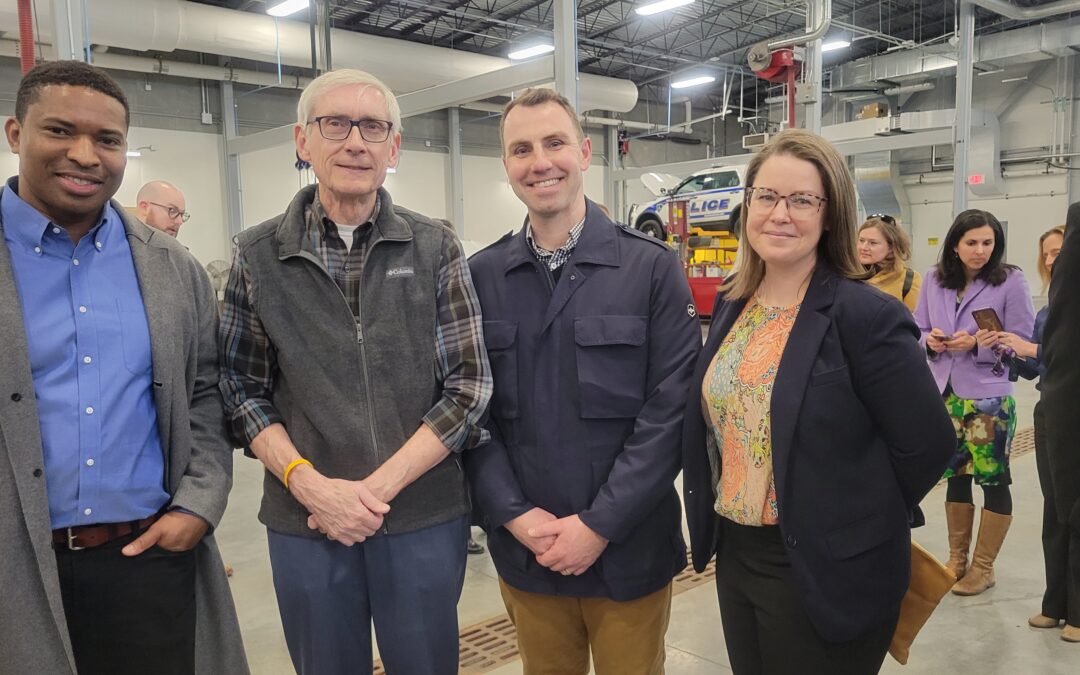
by Heather Allen | Apr 19, 2022 | Electric Vehicles, Energy Storage, Focus on Energy, Jobs, Legislative Watchlist, Local Government, Microgrids, Policy, Press Release, Renewables
Today, Governor Tony Evers introduced Wisconsin’s first-ever Clean Energy Plan. The plan was developed with input from hundreds of stakeholders and provides a pathway for Wisconsin to build a robust clean energy workforce, save billions of dollars, and become more energy independent.
Building a Clean Energy Workforce
The Clean Energy Plan developed by Governor Evers and the Office of Sustainability and Clean Energy (OSCE) identifies opportunities to grow Wisconsin’s clean energy workforce. Wisconsin’s clean energy workforce is 76,000 strong, with good-paying, resilient jobs like installing solar and electric vehicle charging stations, servicing wind turbines, manufacturing energy storage systems, and retrofitting buildings. Wisconsin can take control of its energy future and expand local job creation by investing in renewable energy.
EnTech Solutions, a division of Faith Technologies Incorporated (FTI) based in the Fox Valley, is a leader in distributed energy capabilities, eMobility charging, innovative sustainable fuel technologies, and asset management solutions for businesses looking for reliable, clean energy solutions. “EnTech Solutions is growing to satisfy the high demand for emerging technologies like microgrids, distributed energy systems, and renewable energy EV chargers,” said Tom Clark, chief experience officer with FTI. “Our clean energy workforce develops innovative solutions to solve our customers’ energy challenges.”
The Clean Energy Plan will generate 40,000 new jobs in Wisconsin by 2030, or 6,000 new jobs per year. The plan will create a Clean Energy Workforce Advisory Council and strengthen the workforce with apprenticeship tracks and reentry training for formerly incarcerated individuals. Demand for clean energy workers in Wisconsin is high and growing. State leadership will ensure Wisconsinites have access to training and jobs to help them embark on clean energy careers.
Save Wisconsinites Money
The Clean Energy Plan will accelerate renewable energy and energy efficiency solutions in commercial, residential, and multifamily new construction. Wisconsin families and businesses can save money on monthly energy bills with renewable energy investments, energy efficiency measures, and demand response technologies.
A recent study by Synapse Energy Economics Inc. found that greater investment in Focus on Energy, Wisconsin’s energy efficiency and renewable energy program, would help Wisconsin reap millions in benefits through avoided utility costs, job creation, economic investment, and reduced air emissions. Overall, the report found that if Wisconsin doubled the Focus on Energy budget, the state would receive $340 million in net benefits over one year or $3.4 billion over ten years. The expanded incentives for Focus on Energy outlined in the Clean Energy Plan would create a clean, efficient Wisconsin energy economy for everyone!
Reduce Dependence on Fuel Imports
Wisconsin can be free from the instability of oil and natural gas by investing in renewable energy and electric transportation. Wisconsin currently spends billions of dollars every year to import fossil fuels. The Clean Energy Plan will focus state investments on homegrown, renewable energy and electric vehicle infrastructure.
The Clean Energy Plan will speed the deployment of electric vehicles and charging stations around Wisconsin. The plan lays out strategies for state agencies and local governments to lead the way to build a comprehensive infrastructure for electric vehicle charging stations that will reduce the state and individual dollars spent annually on importing oil and gasoline.
We congratulate Governor Evers and all contributing stakeholders on developing this comprehensive Clean Energy Plan. RENEW is poised to help advance renewable energy, and we look forward to collaborating with state agencies and other partners to build Wisconsin’s clean energy future.
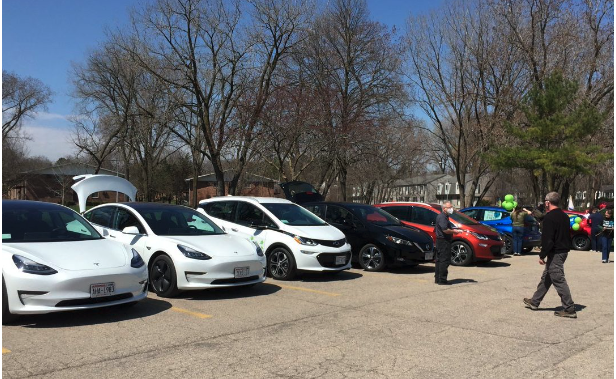
by Francisco Sayu | Apr 11, 2022 | Community, Electric Vehicles, Events, Local Initiatives
On Friday, April 22, 2022, Drive Electric Wisconsin, RENEW Wisconsin, Slipstream, Wisconsin Clean Cities and the Dane County Office of Energy and Climate Change will be hosting an Earth Day Electric Vehicle (EV) Parade in Madison.
A variety of electric vehicles will converge at Demetral Park at 1:00 pm. The parade will depart the park at 2 pm, drive through downtown, make two loops around Capitol Square, and return to Demetral Park. Spectators are encouraged to attend at Demetral Park, Capitol Square, or along the parade route.
All battery electric vehicles (BEVs), plug-in hybrid electric vehicles (PHEVs), electric trucks, and electric motorcycles are welcome to join the parade. For more information and registering for the event, please visit Earth Day EV Parade.
In the Wisconsin transportation sector, GHG emissions are the second-largest source of emissions; EVs currently present the most substantial potential to significantly reduce GHG emissions in the transportation sector, primarily when electricity is generated with low-carbon resources. EVs provide many benefits, including lower maintenance costs, lower fuel costs, zero local emissions, quieter operation, and faster acceleration. As Wisconsin continues to transition to clean energy, the environmental benefits of “driving electric” will continue to increase.
Local residents Carol and Andy Phelps organized Madison’s first Earth Day EV Parade in 2020 as a way to celebrate EVs and Earth Day amid the pandemic. In 2021, more than sixty vehicles joined, RENEW Wisconsin, Slipstream and Dane County Office of Energy and Climate Change for the second Earth Day EV Parade. Many EVs and electric motorcycles are expected at this year’s parade, including Ford, Volkswagen, GM, Tesla, Nissan, Hyundai, Kia, Toyota, Audi, Porsche, BMW, Mercedes-Benz, and Harley Davidson.
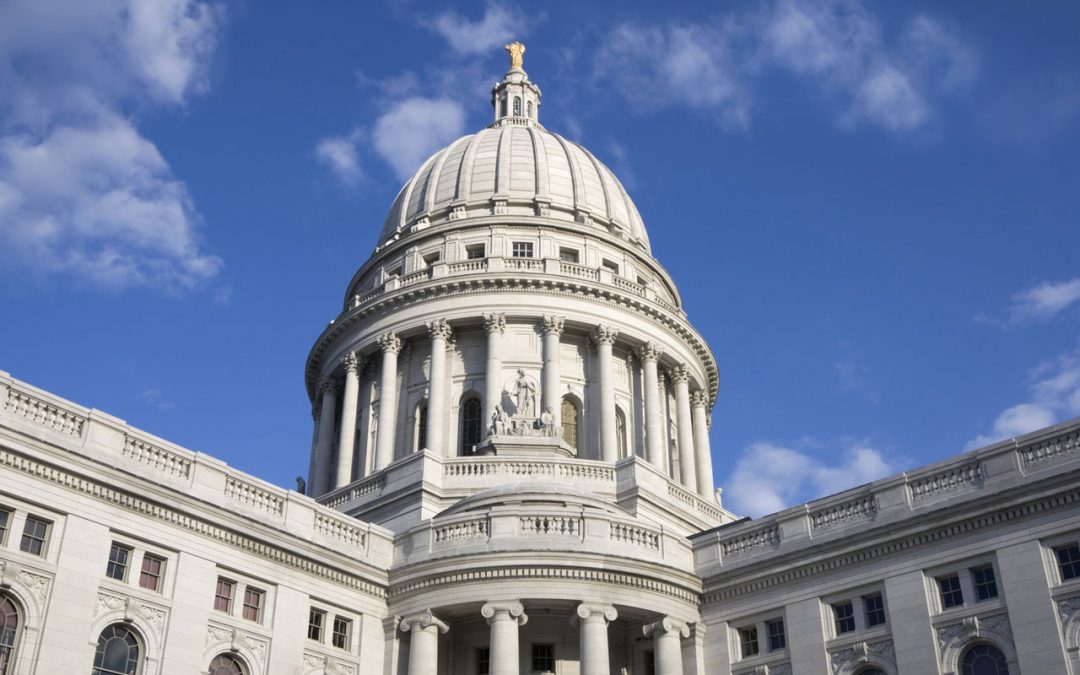
by Jim Boullion | Mar 18, 2022 | Advocacy, Community Solar, Electric Vehicles, Energy Storage, Legislative Watchlist, Local Government, Policy, Solar
The 2021-22 legislative session in Wisconsin is now over. It was a busy session for clean energy initiatives with legislation introduced to allow more community solar, clarify the rules for leasing solar equipment, and update the regulations for electric vehicle (EV) chargers. Most of these bills were bipartisan, with support on both sides of the aisle. See the bottom of this article for a summary of this year’s major clean energy legislation.
The session started when Governor Tony Evers introduced his 2021-23 Budget Bill in February 2021. It included 28 provisions (many of them drawn from the Governor’s Taskforce on Climate Change) that would have advanced Wisconsin’s clean energy and energy efficiency. Among those provisions were recommendations to expand Focus on Energy, invest in the clean energy workforce, and support Wisconsin’s electric vehicle infrastructure. Unfortunately, by the time the Governor signed the Budget in July, those provisions were removed from the Budget and did not pass.
On November 15, several Democratic legislators introduced a package of 22 bills called Forward on Climate. The package proposed increased funding for Focus on Energy, on-bill financing of energy efficiency improvements from utilities, and a Wisconsin Climate Corp to provide training and opportunities in clean energy industries for Wisconsin’s youth. The session ended without any of these bills being adopted. Still, it outlined what kinds of initiatives they support to create good, family-supporting jobs, reduce inequality, and fight climate change through Wisconsin-centered policies.
What passed and what progress was made?
The only major clean energy bill that passed this session was a bill to modernize the PACE financing program. However, many clean energy initiatives made in-roads with legislators from both sides of the aisle. The new technology developments and dropping prices for renewable energy over the last few years is an excellent story for reducing emissions, bolstering economic growth, diminishing energy prices, and creating jobs. Even if there are still hurdles to overcome, everyone is interested in learning more.
There is growing interest among a wide range of stakeholders in clean energy legislation. The best example is SB 490, the community solar bill, where many diverse interests have registered in support. While some groups have expressed concerns with the bill, most business and public interest groups who registered support this kind of change.
Even though we didn’t pass them this session, electric vehicle legislation is also getting attention, especially in light of the volatile gas prices this year. As the price of EV battery production falls, the initial price of EVs will get more competitive, making the cost of EV operations compared to petroleum-powered vehicles very attractive.
The EV transition is coming fast, and we need to be ready. We need to finalize the rules and regulations over EV charging, determine how to pay for the roads if the gas tax generates less income, and streamline the buying process for new EVs coming into the market. One of the big things happening in the coming year is the millions in federal Infrastructure Investment and Jobs Act money coming to Wisconsin for EV infrastructure. We need to work with all stakeholders to ensure that Wisconsin can utilize that money efficiently.
What happens next?
Over the summer and fall, RENEW Wisconsin will meet with candidates running for state and federal office. We will be educating them about new developments in clean energy and electric vehicles and discussing essential policy changes we need to make these advances available to everyone in Wisconsin.
You can also do your part by getting involved in your local elections, talking to your local candidates, and supporting the candidates who support clean energy with your votes, time, and financial contributions. This time of year, candidates are especially interested in what you have to say and will take the time to listen. Clean energy can have a big year in 2023, but only if we do the work this year to educate and help elect candidates who will support us!
If you would like information on any clean energy issues or the elections, please contact Jim Boullion, Director of Government Affairs, jim@renewwisconsin.org,
2021-22 Wisconsin Legislative Session
Clean Energy and Electric Vehicle Issue Summary
PACE Financing Modernization – (SB 692/Wisconsin Act 175 – Sen. Cowles and Rep. Thiesfeldt)
- Expands type of projects that may be financed: Adds energy reliability improvements, weather-related resiliency projects, electric vehicle charging infrastructure, and stormwater control measures.
- Financing: Defines the term of the repayment period, clarifies that financing may be repaid through a lien, and ensures that mortgage holders provide written consent before the issuance of funding.
- Performance Requirements: Removes the requirement for project savings to exceed project costs and would instead require a third-party assessment of the anticipated energy and water cost savings from the proposed project and confirmation of proper installation after work is completed.
- Excludes Residential PACE: Prohibits PACE financing for residential units of less than five units. PACE loans will remain only for commercial or industrial buildings.
Assembly: Passed on voice vote (2/23/2022) and sent to Governor for signature.
Senate: Passed 32-0 on 2/15/22.
RENEW Position: Support.
EV Charging Rules – (SB 573 – Sen. Cowles and Rep. VanderMeer) Clarify that selling electricity by the kilowatt-hour to electric vehicles (EVs) does not subject EV charging station owners to utility regulation. No city, village, town, county, school district, special purpose district, or state agency may own, operate, manage, lease or control a charging facility. Local governments can authorize a utility or private entity to operate a charger on their property. Requires that all energy come from the local utility, limiting Solar+Storage EV charger availability.
Senate: Passed on vote of 19-13 (2/15/2022). Did not concur with Assembly Amended bill 3/8/22
Assembly: Passed on voice vote, with amendment, (2/24/22). Failed to pass.
RENEW Position: Oppose due to restrictions on non-utility energy sources and restrictions on the State and local governments from owning or operating EV chargers.
Expanded Development of Community Solar – (SB 490 / AB 527 – Sen. Stroebel and Rep. Ramthun) Would authorize the development of non-utility-owned community solar projects, allowing more individuals and businesses to access clean energy, save money and create good-paying jobs. Require local investor-owned utilities (Cooperative and municipal utility territories would be exempt) to provide credits on utility bills of subscribers for the energy generated by the system. Directs the PSC to develop rules that will establish fair credit rates and compensation to utilities for the use of utility infrastructure and billing.
Assembly: Energy and Utilities. Failed to pass.
Senate: Utilities, Technology, and Telecommunications. Failed to pass.
RENEW Position: Support
3rd Party Financing/Leasing – (SB 702 / AB 731– Sen. Cowles and Rep. Cabral-Guevara) Clarify that 3rd party financing/leasing of renewable energy equipment is legal in Wisconsin.
Assembly: Energy and Utilities. Failed to pass.
Senate: Utilities, Technology, and Telecommunications. Failed to pass.
RENEW Position: Support
Energy Storage Sales Tax Exemption – (SB 672 /AB 710 – Sen. Cowles and Rep. Duchow) Clarify that battery storage devices installed as part of a renewable energy system should be included in the sales tax exemption for renewable energy system equipment.
Assembly: Committee on Ways and Means. Failed to pass.
Senate: Committee on Financial Institutions and Revenue. Failed to pass.
RENEW Position: Support
Use $10 million of VW Settlement Funds for EV Charging Station Grants – (SB 663/AB 695 – Sen. Cowles and Rep. VanderMeer) Grants from these funds will be used to install electric vehicle charging stations at key locations throughout Wisconsin. Requires the PSC and DOT to study how the growing number of EVs will impact the transportation fund and determine methods to ensure they contribute to that fund equitably. Grant recipients can only resell electricity obtained from the local electric utility. $5m for EV Corridors; $3m for businesses or multifamily; $2m to be determined by PSC.
Senate: Committee on Transportation and Local Government. Passed committee 5-0. Failed to pass.
Assembly: Committee on Energy and Utilities. Failed to pass.
RENEW Position: Support
Direct Purchase of Electric Vehicles – (SB 462 / AB 439 – Sen. Kooyenga and Rep. Neylon) Would enable electric vehicle manufacturers to deliver and service vehicles in Wisconsin using online sales or manufacturer-owned dealerships without going through a 3rd party dealership.
Senate: Senate Gov. Operations Committee. Passed Committee 4-1. Failed to pass.
Assembly: Committee on Transportation. Failed to pass.
RENEW Position: Support
Create a System to Measure Carbon Emissions for Animal Agriculture Operators. (SB1054 / AB 1072 – Sen. Cowles and Rep. Tauchen).
- DATCP shall establish voluntary and market-driven standards for quantifying the carbon emissions produced directly and indirectly from an animal agriculture operator’s activity.
- DATCP must facilitate trade in products and services related to transactions between animal agriculture operators and other parties for carbon emission offsets and may operate an electronic marketplace for selling and purchasing carbon emission offsets.
- PSC shall develop a statewide master plan for collecting, transporting, and commercializing renewable natural gas produced from animal wastes, biomass, and other organic sources.
- PSC will establish standardized power purchase agreements and standardized agreements for the provision of energy as a service between animal agriculture operators and electric utilities
Assembly: Committee on Energy and Utilities. Failed to pass.
Senate: Committee on Natural Resources and Energy. Failed to pass.
RENEW Position: Support

by Jim Boullion | Mar 10, 2022 | Action Alert, Advocacy, Electric Vehicles, Energy Storage, Legislative Watchlist, Local Government
Yesterday, in a unanimous vote of 31-0 (2 not voting), the State Senate voted against concurrence in the Assembly amended version of the EV charging bill, SB 573. The bill aimed to define who can provide EV charging services, how customers will pay for it, and the electricity source for the chargers.
Wisconsin law does not have specific guidance on EV charging, so non-utility-owned EV charging stations set their fees on a per-minute basis, not on the amount of energy delivered. This policy results in owners of slower charging vehicles paying more for power than owners of fast charging vehicles. SB 573 would have allowed businesses to set fees based on the amount of electricity used, but several provisions to the bill concerned clean energy advocates.
“While this bill addressed some of the issues with current policy, it would have also disincentivized solar-powered EV chargers and severely limited local government investment in EV charging,” said Heather Allen, Executive Director at RENEW Wisconsin. “RENEW Wisconsin opposed SB 573 in its current form and applauds yesterday’s Senate decision.”
SB 573 would have prohibited charging a fee if any non-utility-generated electricity was provided through a non-utility-owned EV station. The provision would limit the use of rooftop solar and stand-alone solar+storage EV charging equipment in Wisconsin, which provides numerous benefits such as controlling energy costs, facilitating EV charging in rural areas, increasing resilience and safety, and providing carbon-free electricity.
The restrictions on local government ownership or operation of publicly available EV chargers would have reduced access to EV chargers in many underserved areas because revenue from electricity sales alone may not generate enough income to justify private business investment in small towns, urban streets, or other locations. Local government participation allows EV infrastructure to expand in areas where private businesses are not investing.
“While this particular legislation did not pass, the issues the bill was attempting to resolve remains unsettled,” said Jim Boullion, Director of Government Affairs at RENEW Wisconsin. “RENEW Wisconsin will continue to work towards better policies that help everyone in Wisconsin benefit from the fast-developing electric vehicle revolution.”
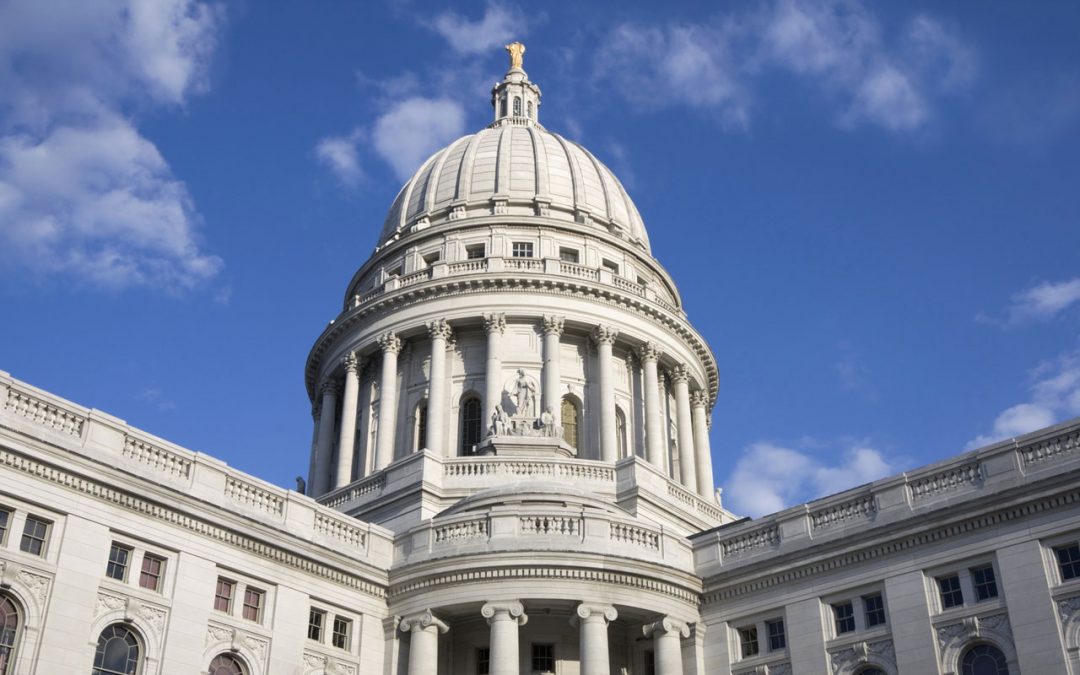
by Jim Boullion | Feb 23, 2022 | Action Alert, Advocacy, Electric Vehicles, Legislative Watchlist
On February 15th SB 573 passed the State Senate on a (mostly) partisan vote of 19-13. All Democrats voted against the bill. Sen. Steve Nass was the only GOP Senator who voted against it.
The State Assembly has placed the bill on today’s floor calendar (Wednesday, February 23rd) for a vote. If it passes the Assembly the bill goes to the Governor for his consideration.
RENEW Wisconsin is opposed to the bill in its current form (Senate Substitute Amendment 3). While this legislation clarifies that selling electricity to electric vehicles (EVs) by the minute or kilowatt does not subject EV charging station owners to utility regulation, it has several provisions that are of concern:
- Requires that all electricity sold through an electric vehicle charger must come from the local utility. This stipulation would prohibit EV chargers that get any of their electricity from a non-utility-owned rooftop or standalone solar+storage system from being available to the public if they charge a fee.
- No local governments, which includes cities, villages, towns, counties, school districts, special purpose districts, or any state agency, may own, operate, manage, lease or control an EV charging facility available to the public. Local governmental units may authorize a utility or private entity to operate a charger on their property.
For background, you can view RENEW’s testimony on this bill here.
Please contact your legislators in the Assembly and ask them to oppose this legislation unless those issues are corrected!
Thank you for your support!
Please email RENEW Wisconsin Director of Government Affairs, Jim Boullion, if you have any questions.





